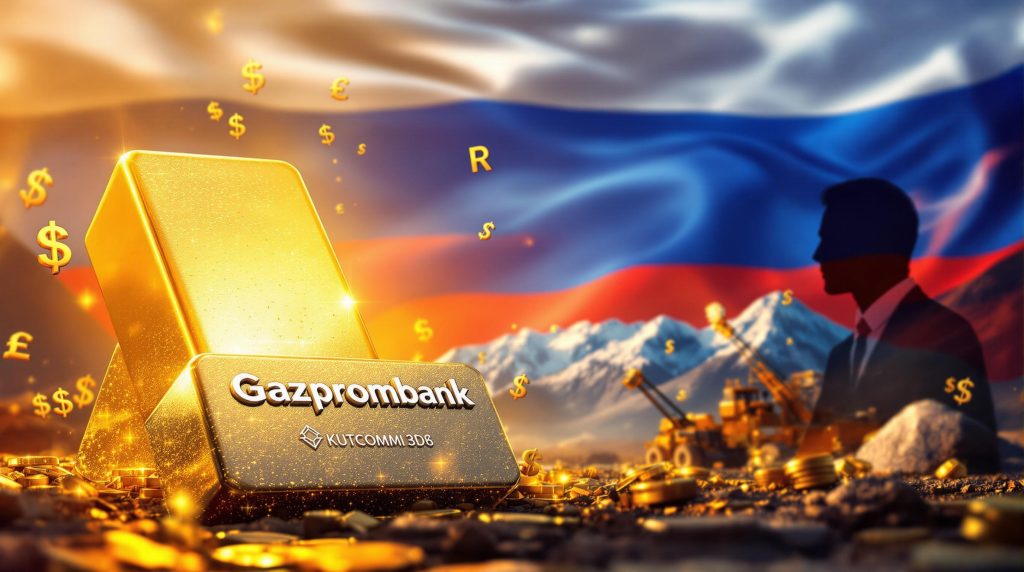Russia Seizes UGC Gold Producer in Latest Strategic Asset Acquisition
Russia's government has seized a 67.8% stake in Uzhuralzoloto (UGC), the country's fourth-largest gold producer, from businessman Konstantin Strukov. Valued at approximately 85 billion rubles ($1.06 billion), the stake will be sold to a Gazprombank unit, with the transaction expected to complete in 2025. This seizure represents the latest in Russia's strategic consolidation of key resource assets and has significant implications for both domestic and international mining interests, including potential impacts on gold price analysis.
Deputy Finance Minister Alexei Moiseev confirmed the government's intentions, stating, "We want (to do it) this year. This is one of the assets we plan to sell as soon as possible." This urgency underscores the strategic importance the Russian government places on controlling its gold production capabilities.
UGC shares showed minimal movement following the announcement, rising just 0.1% – notably underperforming the wider MOEX index, which gained 0.7%. This muted market response suggests investor caution regarding the company's future under new ownership.
Why Russia Is Consolidating Control of Domestic Mining Assets
Russia has intensified its focus on maintaining tight control over strategic natural resources since February 2022, coinciding with the Ukraine conflict. Gold production has emerged as a critical economic asset for Russia, particularly as international sanctions have restricted other financial avenues.
The government has repeatedly cited "strategic stability and domestic security" as justifications for these transfers of assets to state-aligned entities. These justifications reflect Russia's broader strategy of ensuring that key resource sectors remain under influence aligned with national interests.
This pattern of asset seizures is part of a systematic approach to consolidating state power in resource extraction industries. Research published in July 2025 revealed that approximately $50 billion in assets have been transferred to state coffers over the past three years through various seizure mechanisms.
Legal Framework Enabling Asset Transfers
The Russian government has developed sophisticated legal frameworks to facilitate these transfers, with the general prosecutor's office emerging as a key instrument in these proceedings. In Strukov's case, prosecutors alleged he obtained property "through corruption," a common legal justification in high-profile seizures.
These legal mechanisms provide the government with flexibility in targeting specific assets while maintaining the appearance of rule of law – a delicate balance that allows Russia to manage both domestic and international perceptions of its economic governance.
Konstantin Strukov: Profile of a Billionaire Target
Forbes estimates Konstantin Strukov's fortune at $1.9 billion, making him a significant figure in Russia's business community. His dual role as both a business leader and political figure likely contributed to his vulnerability – Strukov has served on Chelyabinsk Region's legislative assembly since 2000 and holds the position of deputy speaker in the regional parliament as a member of the ruling United Russia party.
Dmitry Malbin, a lawyer who represented UGC in court, attempted to distance the company from political connections, stating that "UGC complies with the law and had never benefited from Strukov's position in the Chelyabinsk assembly." However, these protestations proved insufficient to prevent the asset seizure.
International Sanctions as Contributing Factors
Strukov faces sanctions from several Western countries, including Britain, which specifically cited his work in the Russian extractives sector as supporting the Russian government. These international sanctions likely made him a more vulnerable target for domestic action, as internationally sanctioned individuals and their assets represent lower diplomatic risks when seized.
The targeting of sanctioned business figures demonstrates Russia's pragmatic approach to asset consolidation – focusing on individuals with limited international recourse options while simultaneously addressing Western economic restrictions.
Gazprombank's Expanding Mining Portfolio
The transfer of UGC to Gazprombank represents a significant expansion of the bank's mining interests. Through its affiliate AAA Capital, Gazprombank already owned a 22% stake in UGC prior to this acquisition. Once completed, the deal will give Gazprombank-linked entities approximately 90% control of UGC, with the remaining 10% of shares floating on the Moscow Exchange following public offerings in 2023-2024.
This consolidation of ownership under Gazprombank creates a hybrid model of state influence – maintaining market structures and operational flexibility while ensuring alignment with government priorities. This approach differs from direct nationalization, potentially offering greater efficiency while still achieving strategic control objectives.
Anticipated Operational Changes
While specific operational plans remain undisclosed, state-aligned ownership typically prioritizes production targets that support national economic objectives, sometimes at the expense of maximum profitability. New management will likely implement different strategic priorities focused on domestic resource security rather than maximizing shareholder returns.
International partnerships may be further constrained due to existing sanctions against UGC. The company's new ownership structure could potentially redirect export patterns to accommodate sanctions and forge new economic partnerships with countries less aligned with Western restrictions.
Broader Implications of Russia's Strategic Asset Seizures
The seizure of UGC represents more than an isolated incident – it signals continued uncertainty for both domestic and foreign investors in Russia's natural resource sectors. With $50 billion in assets already transferred to state control since 2022, the scale of intervention demonstrates Russia's commitment to reshaping its economic landscape.
This approach differs from traditional nationalization by using corruption allegations as legal justification rather than blanket industry control. The selective targeting suggests political considerations play a significant role in determining which assets are prioritized for transfer.
Note: The trend of selective asset seizures in strategic sectors creates significant risk premiums for private investments in Russian natural resources. Companies with politically exposed ownership are particularly vulnerable to similar legal actions.
Impact on Russia's Gold Mining Industry
UGC's transition to state-aligned ownership could trigger broader industry consolidation as remaining private producers reassess their positions and vulnerabilities. Production priorities across the sector may shift to serve national strategic interests rather than purely commercial objectives.
Export patterns will likely continue evolving to accommodate both sanctions and new economic partnerships, particularly with countries that maintain closer economic ties with Russia despite international restrictions. According to Reuters reports, Russia's gold sector is increasingly looking eastward for new market opportunities.
Russia's Economic Strategy and the Strategic Value of Gold
Gold provides Russia with a sanctions-resistant store of value – a critical consideration as the country navigates international financial restrictions. Domestic production offers economic security that cannot be easily disrupted by external financial measures, making control of gold producers a logical priority for the gold market surge we've witnessed recently.
The transfer of UGC to Gazprombank rather than direct state ownership represents a strategic choice that maintains the appearance of market structures while ensuring state influence. This approach potentially offers more operational flexibility than direct government control while still aligning with national economic objectives.
Creating New Economic Structures
Russia's approach to resource nationalization represents an evolution of traditional models. By using state-affiliated companies as intermediaries rather than implementing direct government ownership, Russia creates a hybrid model that preserves some market mechanisms while ensuring strategic alignment.
This model potentially offers advantages in both domestic and international contexts – providing operational flexibility domestically while presenting a more market-oriented face internationally, potentially mitigating some diplomatic and economic consequences.
Implications for Global Gold Markets
As Russia's fourth-largest gold producer, changes in UGC's management could potentially affect production efficiency and output volumes, though the immediate priority appears to be maintaining production continuity. Export patterns may shift depending on sanctions and new ownership priorities, potentially redirecting gold flows to different international markets.
The seizure highlights political risk in resource-rich countries and may lead market participants to factor higher risk premiums into Russian mining assets. This could have downstream effects on investment patterns and valuation models for companies operating in similar jurisdictions. Experts are closely watching how these developments affect record-breaking gold prices seen in recent months.
Market Fragmentation Along Geopolitical Lines
Global gold supply chains continue to fragment along geopolitical lines, with Russian production increasingly directed toward trading partners less aligned with Western sanctions regimes. This fragmentation creates both challenges and opportunities in global markets, with potential price differentials emerging between different trading blocs.
Long-term investors should consider these geopolitical factors when developing their gold market strategies as the landscape continues to evolve.
FAQ: Russia's Seizure of UGC Gold Producer
What percentage of Russian gold production does UGC represent?
UGC is Russia's fourth-largest gold producer, representing a significant portion of the country's gold output, though specific production figures were not disclosed in recent reports.
Will the seizure and sale affect global gold prices?
While UGC's production is significant within Russia, the transfer of ownership alone is unlikely to substantially impact global gold price forecast, as production is expected to continue under new ownership. Market impacts would mainly emerge from any subsequent operational changes.
Are other Russian mining companies at risk of similar seizures?
The pattern of asset seizures suggests that other mining companies, particularly those with politically exposed owners or strategic importance, could face similar actions. Companies with sanctioned ownership are at particularly elevated risk.
How has UGC's stock price responded to the seizure announcement?
UGC shares rose only 0.1% following the announcement, significantly underperforming the wider MOEX index, which gained 0.7%. This muted response indicates investor caution about the company's prospects under new ownership.
What legal justification did Russia use for the seizure?
Prosecutors alleged Strukov obtained property "through corruption," specifically citing his political position as deputy speaker in Chelyabinsk's regional parliament as a potential conflict of interest. According to Interfax reporting, the case relied heavily on technical violations of political disclosure requirements.
Disclaimer: This article contains analysis and speculation regarding future market conditions and geopolitical developments. Readers should conduct their own research and consult with financial advisors before making investment decisions based on this information. The mining industry is subject to significant political, regulatory, and market risks that can rapidly change asset valuations and operational conditions.
Want to Catch the Next Major Gold Discovery Before the Market?
Discovery Alert's proprietary Discovery IQ model delivers real-time notifications when significant mineral discoveries are announced on the ASX, helping you capitalise on potential opportunities before they make headlines. Explore how historic discoveries have generated substantial returns by visiting our dedicated discoveries page and position yourself ahead of the market.




